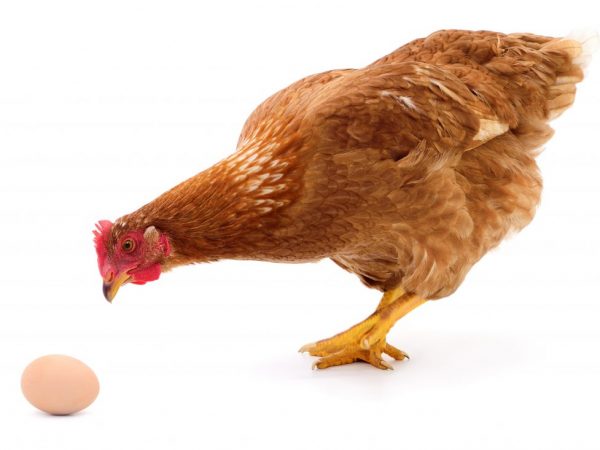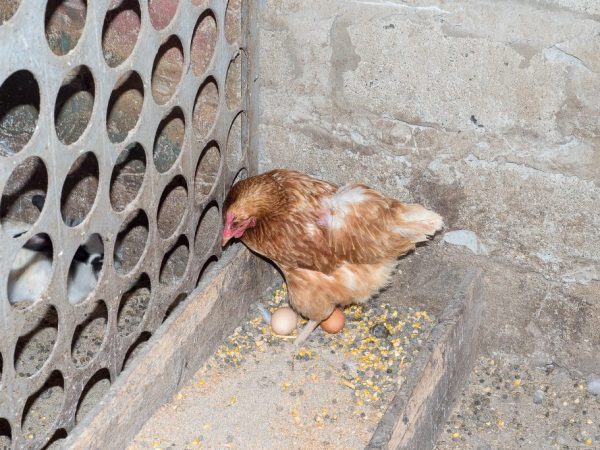Why chickens peck eggs and how to deal with it
Often, breeders have to deal with the problem when chickens peck eggs. Having tried such a delicacy once, the chicken cannot refuse it and thereby sets a bad example for other individuals. Information about why chickens began to peck eggs and how to solve this problem will be useful for many poultry farmers, especially beginners.

Why chickens peck eggs and how to deal with it
Main reasons
There are several reasons why chickens began to peck at eggs.
- Calcium deficiency. In this case, they peck the shell, leaving the contents intact. It is easy to calculate the lack of this trace element in the body of laying hens - their eggs have a very thin and fragile shell.
- Lack of protein. Chickens usually suffer from a lack of it in winter, when the diet is poorer than in summer and spring. Eating only plant foods prompts the bird to look for other food sources, as a result of which it begins to peck at its eggs.
- Lack of vitamin D. Often its deficiency occurs in winter due to short daylight hours. You can find out that chickens suffer from vitamin deficiency by several symptoms: the bird walks like a penguin, the horns (beak, claws) become soft, the eggshell of the hens is thin, lameness often occurs and swelling of the joints is noted. Other factors are a slowdown in the growth process of young animals, cases of cannibalism, inability to maintain balance with a normal footstand.
- Stressful situations are another cause of egg biting, caused by moving to another house or by a sudden drop or rise in house temperature.
- A cramped place for laying eggs. If the nest is brightly lit and there is little room in it, the hen may inadvertently trample the eggs and begin to eat their shells. In the absence of a nest, hens lay eggs directly on the floor, as a result of which they can easily be crushed by a rooster and subsequently pecked.
- Young laying hen. Often, due to inexperience, such chickens do not know what to do with the first eggs - they begin to turn and peck them. If you have adult chickens, the young will follow their example and eventually stop destroying their clutch.
- Stiffness of movement. Birds that sit on nests for a long time and do not have opportunities for walking (which is why they cannot peck insects, grass) begin to peck at their eggs. This phenomenon can often be observed in winter.
- Aggression. Usually impulsive and aggressive behavior is caused by lack of food. Regular hunger encourages hens to look for additional food, so they begin to peck on their own or someone else's eggs. Also, an aggressive character is inherent in some breeds: Yurlov vociferous, Orlov, Dakan. Such individuals require special care to avoid pecking - daily walking, proper nutrition (in large quantities), a lot of space.
Ways to solve the problem
To solve the problem of pecking eggs, it is necessary to take appropriate measures for the reasons described above.
Change of diet
For chickens who eagerly pounce on chicken eggs, calcium should be included in the diet. Some breeders use washed and powdered shells - they are added to mash and dry food. But, as practice shows, this method of replenishing calcium does not wean chickens from further pecking eggs.
The best way to solve the problem is to add meat and bone meal and pieces of chalk to the feed. These components should always be in the chicken coop. They are placed in different places, with the exception of the nests.
To replenish the protein, feed the birds with ground fish and meat waste, and also give them low-fat cottage cheese. Within a week after full nutrition, the chicken will wean from pecking.
With a lack of vitamin D, they give specialized preparations from the pet store, which normalize its amount in the bird's body. You can also add fish oil to your diet.
Lighting adjustment
Good lighting in the kurnik plays an important role. Many breeders report that chickens do not peck eggs when illuminated using blue and red lamps.
In addition, the length of daylight hours is important: in winter, they need at least 8 hours a day. For this, the kurnik is equipped with additional windows and lamps. The light is needed not too bright, better diffused and dim.
Changing the socket design
The number of nests in a hen house depends on the number of laying hens. They should be spacious. The nest is arranged in a quiet, dark place.
It is covered with straw or hay so that the chicken can lay on a soft surface. This will eliminate the risk of damage and further pecking of the eggs.
Many people use a wooden box for convenience, in which the chicken is protected from excess noise and bright light.
Expansion of the aviary
Often the hen will bite the eggs because there is not enough room to walk. After staying in a spacious aviary, where there is a lot of grass and all kinds of insects, the chicken will not eat its clutch.
To wean a bird from this bad habit, it is necessary to calculate the area for one individual. The norm is 1 m². But, as practice shows, the more free space a bird has, the less likely this problem will occur.
Additionally, a shelter can be made above the aviary, and perches can be installed under it. So chickens will be able to walk even in winter and peck on the remnants of food under the snow.
De-picking
This is one of the harshest methods of dealing with the problem and is not welcomed by animal advocates. It is often used in large poultry farms. Its essence lies in cutting the bird's beak, as a result of which it experiences pain when pecking sharp objects and tries to avoid them.
Use of pharmacy products

Problems in pecked eggs are solved
When all the above measures are useless, veterinarians advise breeders to use pharmaceutical preparations at the rate of 10-15 g of substance per 10 kg of feed. Several effective remedies are recognized as the most popular:
- "Methionine";
- "Laying hen";
- "Ryabushka";
- Biovetin;
- Vitaminol;
- "Chiktonik";
- Rex Vital.
Drug therapy is an adjunct in solving this problem. Therefore, it is used in conjunction with other activities.
Traditional methods
Folk remedies will help wean chickens who peck their eggs from this bad habit.
Dummy
You can fight pecking with this method if other methods do not work. The bird is given a dummy made in the following ways:
- from salted dough. It is necessary to pour 200 g of salt in 200 ml of water, dissolve, add a glass of flour and knead the dough in the shape of an egg;
- take an egg, pierce it gently with a needle, draw out its contents with a syringe and fill the empty shell with a solution of vinegar, mustard, black pepper and water.Before giving the blende to the chicken, it is important to observe the proportions: the solution should be sharp and unpleasant in taste, but edible and not harmful to health. Such a fight against pecking helps to solve the problem after a few days - the chicken tries to peck the egg several times, but she does not like its taste. After a while, she will develop a reflex, thanks to which she will get rid of a bad habit;
- laying "false eggs". Many breeders put tennis balls, wood dummies or golf balls in the nests. Unsuccessful pecking will sooner or later bother the laying hen, and she will be able to wean herself from pecking.
Flame cooling
This radical method helps to quickly wean the chicken from the bad habit. She is dipped in a barrel of water. This procedure is carried out several times and only in the summer, since in winter there is a high probability of developing colds.
Distribution by age
Young chickens are separated from adults, because conflicts often arise between them, due to which eggs are damaged. Broken or cracked chickens eagerly begin to eat.
Application of eyecups
Mostly they are worn by aggressive breeds in order to narrow their view and thereby pacify the bird, to avoid the problem of pecking eggs.
Nest with egg collector
This is one of the best ways to keep your eggs intact. To do this, take a ready-made wooden box. The bottom is mounted, pasted over with a sliding material, for example, linoleum. The bottom is nailed at a 10 ° slope so that the eggs can gradually roll into the tray at the back of the nest.
As a tray, you can use a plastic pipe cut in half horizontally. The bottom of the tray is covered with any cloth that will prevent damage to the eggs when rolling.
Such a hand-made device can be installed simultaneously for several individuals. The nests are set up at a height that is comfortable for the hens so that they can easily climb into them.
Conspiracy
A simple and effective conspiracy will help get rid of the problem. It is necessary to take water and wheat and speak words over them.
Chickens are white, black, speckled. Do not peck at the stars of heaven, as well as eggs in their nests. Words on a key, under a lock. Amen.
The spell must be read daily until the chickens stop destroying their eggs.
Prophylaxis
Pecking of eggs is referred to as pathologies that not only lead to a decrease in productivity, but also contribute to an increase in aggression in the herd. Impulsive individuals become dangerous to weakened birds.
In order not to have to deal with pecking eggs, you should follow simple preventive measures:
- feed poultry with a balanced feed, which contains vital substances - calcium, protein, vitamin D;
- collect eggs on time;
- regularly clean up the remains of feed and debris in the chicken coop;
- feed in the required amount to prevent the development of hunger and, as a result, pecking of eggs;
- provide a spacious place with grass for walking;
- normalize the temperature regime in the hen house - chickens love coolness in summer, and warm in winter.
If only one chicken pecks eggs, you need to remove it from the herd, in extreme cases - put it on the slaughter.


